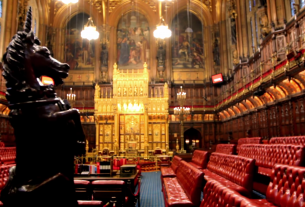The monarch returned to parliament for the second time in nine weeks to deliver what Boris Johnson claims is the “most radical” Queen’s Speech “in a generation”.
Brexit, the NHS and terrorist sentencing – three key issues from the election campaign – dominated the speech which also laid out plans for constitutional reform and measures to deal with spies and traitors.
Priority is Brexit
The Queen’s 66th Queen’s Speech began with Brexit: “My government’s priority is to deliver the United Kingdom’s departure from the European Union on the 31st of January,”
The EU withrdawal agreement bill gets its second reading tomorrow and will include a new clause preventing the transition period extending beyond the end of 2020 – news of which saw the value of sterling and share markets fall this week.
The Queen announced a new immigration bill to end free movement post Brexit, when EU citizens will be “subject to the same UK immigration controls as non-EU citizens” and the introduction of an Australian-style points-based entry system . A further bill will see EU regulations on financial markets replaced or updated.
NHS – funding, visas and car park charges
The election campaign’s other big issue, the NHS was dealt with by the proposal of two bills to enshrine in law funding increases – specifically a £33.9 billion boost by 2023-24 – and a long term plan for the health service.
The plan includes measures to remove hospital car parking charges “for those in greatest need” as well as a new visa for migrant health workers to “ensure qualified doctors, nurses and health professionals have fast- track entry to the United Kingdom.”
Terrorism and law and order
Eight bills dealing with law and order will be introduced including plans to make violent and sexual offenders serve a minimum two-thirds of their sentence and another to increase the term served by immigrants who have returned to the UK breaching deportation orders.
A new counter-terrorism bill will also see tougher sentences for those found guilty and a minimum 14-year-term for the most serious crimes. Early release for terrorists who receive extended determinate sentences will be removed, as too the automatic mid-sentence release, which will be extended to two-thirds of the sentence.
Constitutional changes
Changes to the UK’s unwritten constitution was hinted at but very little detail provided other than the mention of the establishment of a “constitution, democracy and rights commission”, as well as the repeal of the Fixed-term Parliaments Act.
The Tories’ manifesto provided more hints at what the reforms may entail, stating that post-Brexit the government will “look at the broader aspects of our constitution: the relationship between the government, parliament and the courts; the functioning of the royal prerogative; the role of the House of Lords; and access to justice for ordinary people”.
The manifesto said the intention of the commission is to “restore trust in our institutions and in how our democracy operates.” Controversial proposals to oblige voters to show photographic ID at polling stations – mentioned in the previous Queen’s Speech and labelled then as “threat to democracy” – were repeated.
Spies, traitors and servicemen
Among new policies absent in October’s Queen’s Speech were outlines for legislation dealing with spying and treason with the 151 page government briefing document stating they are “considering whether to follow allies in adopting a form of foreign agent registration, updating the Official Secrets Acts for the 21st century, as well as the case for updating treason laws.”
The Sun’s political editor Tom Newton Dunn said the “major new espionage legislation” is the “most interesting part of the Queen’s Speech” tweeting that there was “no mention whatsoever of new powers for security services in the Tory #GE2019 manifesto.”
He suggested this was so as not to “spook [the] civil liberties lobby” and added intelligence chiefs argue that the measures “will be crucial to tackle Russia’s hybrid warfare threat.”
The speech also contained a proposal for legislation to protect the armed forces’ service men and women from “vexatious claims” with an armed forces (legal protections) bill.
The other bills outlined in the speech have mostly been previously announced and include tougher regulations for fire safety and measures to tackle domestic abuse.




